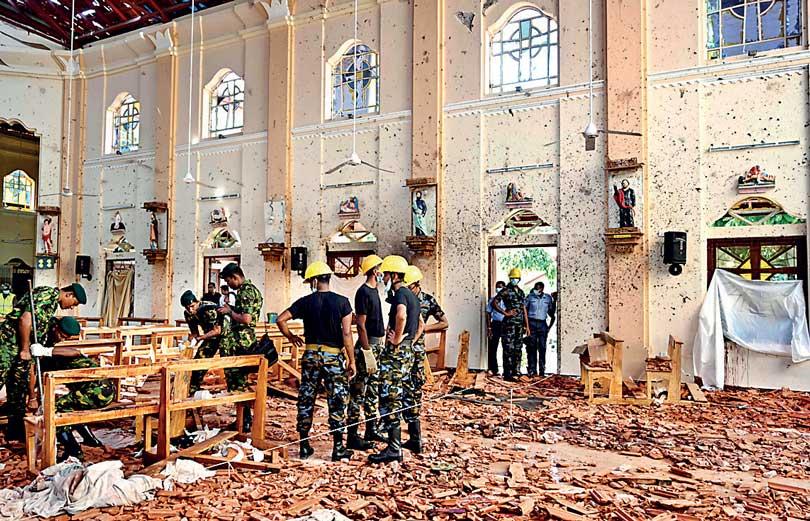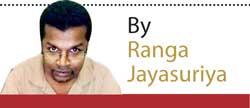Reply To:
Name - Reply Comment

At a commemoration event at St. Anthony’s Shrine in Kochchikade, Malcolm Cardinal Ranjit, maintained that The Roman Catholic church- in the majority Buddhist nation- no longer trusted the authorities to expose those behind the bombings
The National People’s Power of the JVP issued a seven-point agenda that it said would be implemented if it comes to power to hold accountable those responsible for the tragedy and serve justice to the victims
The politicization of the Easter Sunday attack is not only undermining the Sri Lankan state, but it also distracts the security agencies from the real threat of Islamist extremism
 Five years ago, on Easter Sunday, a group of local Islamists carried out coordinated suicide attacks targeting three churches and tourist hotels, killing over 270 worshipers and tourists and wounding 500 others.
Five years ago, on Easter Sunday, a group of local Islamists carried out coordinated suicide attacks targeting three churches and tourist hotels, killing over 270 worshipers and tourists and wounding 500 others.
The fifth anniversary of that heinous crime, which fell last Sunday (April 21), turned out to be a sordid display of politicking by the political parties, the catholic clergy and other usual culprits, who claim to campaign for justice for the victims.
The National People’s Power of the JVP issued a seven-point agenda that it said would be implemented if it comes to power to hold accountable those responsible for the tragedy and serve justice to the victims.
Sajith Premadasa, the Leader of Samagi Jana Balawegaya, also made a similar pledge in Parliament, promising to launch a fresh commission of inquiry, with the participation of local and international experts within two months of his election.
At a separate event to commemorate the Easter Sunday victims, he said he “would not get into deals” with the ‘mahamolakaruwan’ (Masterminds) of the Easter Sunday attack.
At a commemoration event at St. Anthony’s Shrine in Kochchikade, the scene of carnage five years ago, Malcolm Cardinal Ranjit, who seems to have an opinion on anything and everything, resorted to a scathing attack on the former president, the incumbent and the Sri Lankan state.
Foreign media quoted him as saying, “The Roman Catholic church in the majority Buddhist nation no longer trusted the authorities to expose those behind the bombings.”
The UN’s top envoy to the country, Marc-Andre Franche, told a remembrance service in Colombo that there should be a “thorough and transparent investigation” to uncover those behind the Easter carnage in 2019.
“Sri Lanka suffers from a continuing accountability deficit, be it for alleged war crimes, more recent human rights violations, corruption or abuse of power, which must be addressed if the country is to move forward,” he said.
Probably, Sri Lanka could have done better in the search for justice. Considering that the Supreme Court and several presidential commissions of inquiry have implicated former president Maithripala Sirisena and senior police and intelligence officials, determining their guilt in criminal prosecutions is within the purview of the courts, which earlier held them responsible for failing to prevent the Easter Sunday attacks, despite prior intelligence warnings and ordered them to pay compensations to the victims.
However, that is not the origin of much of the gripe, which is rooted in a bizarre conspiracy theory that a group of Islamist terrorists who have vouched allegiance to Islamic State had blown themselves to help Gotabaya Rajapaksa, an ardent Buddhist nationalist, to power. Cardinal Ranjit and most of his fellow travellers seem to believe, in a varying degree, in this notion. Political leaders, most of them, while knowing deep down their hearts that this is humbuggery, have opted to capitalise on the trope.
Those who have read this column should know very well that this writer has been a consistent critic of Gotabaya Rajapaksa for all the excesses and gross human rights abuses he personified. But, politicising the Easter Sunday attack, hoping to take a swipe at Gotabaya Rajapaksa, or the Rajapaksas as a whole, is a cruel affront to the victims of the Easter Sunday. Only a veritable lowlife would stoop to that low, and such individuals should not have a role in politics or should not be in the robes.
Second, sub-optimal progress in the investigations into the Easter Sunday attack reveals the limits of the institutional capacity of Sri Lanka. Still, they also reveal the complexity of keeping a tab on terrorism and extremism in a polity where Arabization and Wahabism could still be defended as a matter of religious freedom. Maithripala Sirisena was more inclined not to harm those religious sensitivities, fearing the political cost, while neglecting the long-term implications of turning a blind eye to extremism.
For the uninitiated, the Easter Sunday attacks were not the first major terrorist attack in Sri Lanka. In the chequered history of LTTE violence, no major attack, from the massacre of devotees in the Jaya Sirimaha Bodhi to the Dehiwala train bombing to the suicide attacks at the presidential rallies- was investigated, leading to the prosecution of the key perpetrators. But, you did not hear those advocating for justice alleging a tacit state role in those attacks. That was probably the vast majority who perished in a spree of LTTE bombings were Sinhalese Buddhists, who might have a different level of appreciation and attachment to the Sri Lankan state. It is those ethnic fault lines that one should be careful about. Should they be allowed to be exploited in a free-for-all gamble, it would not be long before Sri Lanka would witness the next terrorist attack.
Third, the politicization of the Easter Sunday attack is not only undermining the Sri Lankan state, but it also distracts the security agencies from the real threat of Islamist extremism.
The whole discourse of the Easter Sunday attack is degenerating into a sordid freakshow where the state, and not the Islamists who blew up the innocents, stand accused.
Islamization and the Arabization of some quarters of the Muslim community, leading up to the Easter Sunday attack, created permissive conditions for the Easter Sunday attacks. Popular outcry and scrutiny by the intelligence agencies brought in a momentary check only after the carnage. Now, the current administration has de-proscribed some of these groups, which were the purveyors of Wahabism in the country. Whether adequate security oversight is exercised before such decisions are taken is open to question.
It would be naïve to expect Islamist extremism to be a one-off threat. Moscow theatre attack reveals the perseverance of the perverted ideology, which is not short of followers willing to murder and maim in the name of religion.
The greatest form of justice for the victims of the Easter Sunday massacre is to prevent the repetition of a similar monstrosity.
The politicization of the Easter Sunday attack does the exact opposite.